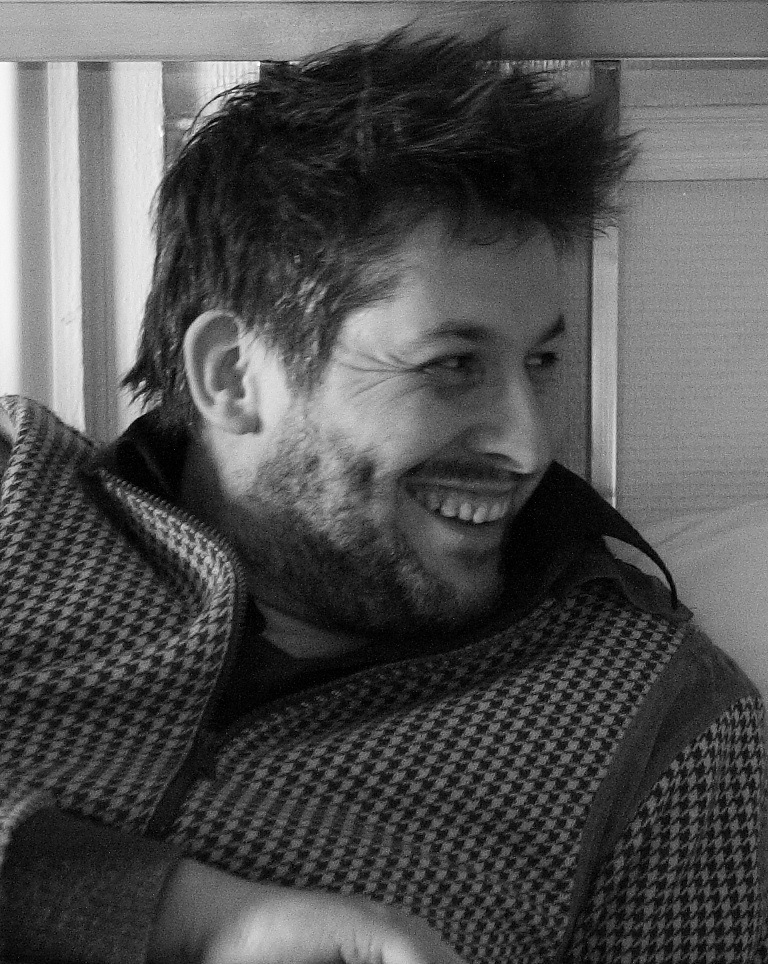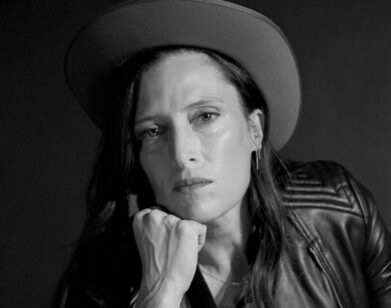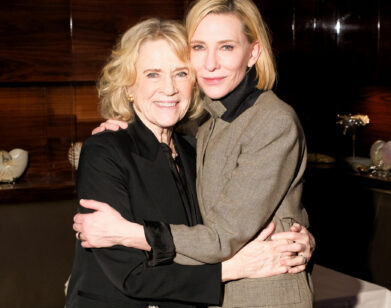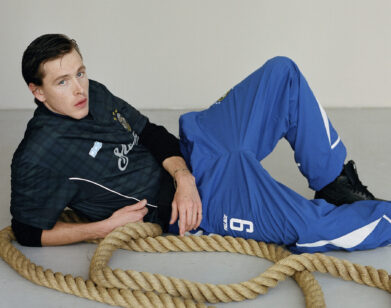Christophe Honoré’s Lost (and Found) Loves

IMAGE COURTESY OF IFC FILMS
Christophe Honoré is an idiosyncratic voice in contemporary French cinema, crafting gorgeously shot, bittersweet, melancholic films that probe the multifaceted intricacies and ambiguities of love, sorrow, and familial relationships. Very much an auteur in the Gallic tradition, his eighth feature, Beloved, held in Un Certain Regard at Cannes, is a musical comedy drama in the same spirit as 2007’s Love Songs. The narrative whips from Paris of the 1960s to Prague on the eve of Soviet occupation to 1990s London to Montreal at the start of the millennium, tracing the romantic adventures of Madeleine (played jointly by Ludivine Sagnier and a fantastic Catherine Deneuve), and her daughter, Vera (Chiara Mastroianni).
Beloved plays on a series of love triangles, and meditates on love lost, love misdirected, and love unrealized. Young Madeleine shoplifts a pair of cognac, crocodile Roger Vivier pumps that lead her both to a new side job (prostitution), and to her eventual husband, Jaromil (played by Rasha Bukvic and director Miloš Forman), a Czech doctor. Thirty years later, Vera pursues an American (Paul Schneider) who cannot seem to give her what she wants or needs. An exceptional Louis Garrel, an Honoré regular, is omnipresent as Vera’s spurned former lover, Clément.
Madeleine, Vera, and Jaromil reunite after 30-odd years of infidelities, new marriages, and lives in different cities, and the intersections of the past and present—heartbreaking at times, uplifting at others—recombine to form a story that is as much about finding some arrangement of happiness, however unconventional, as it as about being fulfilled in love.
Interview sat down with Honoré and his interpreter earlier this week to discuss Beloved as an unintentional musical, Miloš Forman’s ulterior motives for joining the film, casting Catherine Deneuve, and portraying timelessness onscreen.
COLLEEN KELSEY: You made Love Songs in 2007, and the films you made in the interim, The Beautiful Person, Making Plans for Lena, and Man at Bath, are all very much dramas through and through. What made you feel it was time to make a musical again?
CHRISTOPHE HONORÉ: Originally I didn’t want to do another musical comedy. And when I first started the script, there were no songs planned in it. But the person I work with for the musical score is Alex Beaupain, who’s a very good friend of mine. I always talk to him about the scripts that I’m working on, and he always tries to insert one of his songs in it. I said, “Okay, one song.” Two, three, four, five, six… 12. [laughs] I’m joking about it, but I do think that the movie could’ve existed without the songs, as well. The songs, I mean, I like it, but I think in the end, they complicate the film a little bit.
KELSEY: What is it about the musical as a medium that you find to be so attractive for storytelling?
HONORÉ: I’m someone who is pretty modest and doesn’t like to talk about my love stories. Songs bring a lyrical quality to it, simply. It allows the audience to perceive the characters’ love life in a way that is much more obvious than it might have been.
KELSEY: I read that you credit Jacques Demy as the filmmaker who introduced you to the cinema. What about his work has influenced you?
HONORÉ: First of all, it’s a connection that goes back to my adolescence, because I come from Brittany, a part of France that he also comes from. The fact that when I was a kid and everyone was saying, “It’s not going to be possible for you to become a filmmaker,” the fact that Jacques Demy had come from the same region and was able to do it gave me something to hang on to. It made me feel like it was possible. And when I got to know his movies a little bit better, I realized that we share a taste for female heroines. Also, his vision of the family that is a little bit particular, that is not quite conventional. There’s a relationship to reality that is a little bit similar in the sense that it takes place in the present, but the reality is always a little bit transformed.
KELSEY: What is your favorite film of his?
HONORÉ: The Umbrellas of Cherbourg.
KELSEY: Chiara, Louis, and Ludivine have acted in many of your films. Working together for so long, has it grown to feel like a family?
HONORÉ: Who I am for them? Their grandfather, their father? Their mother? It’s always a little strange, because it’s not really a family. That’s not true. I’ve known Louis since he was very, very young, and I speak to him basically every week on the phone. And right now, I’m writing a screenplay with him that he’s going to film. It’s true that when it comes to Ludivine or Chiara, they’ll talk to me about their projects, they’ll say, “Hey, I just got a script from this director, what do you think?,” etc., so it ends up being a group. A team, but not quite a family. Even if I sometimes have some somewhat negative thoughts, for instance, if I see them in somebody else’s movie, I feel jealous and possessive. But the relationship of an actor and a director, it’s not an untouchable entity. That’s good. You want it to stay a little bit shaky, because if you offer a role to an actor, you want them to feel that you’re offering the role because you really want them to play it, not out of some kind of habit.
KELSEY: This is the first time you’ve worked with Catherine Deneuve, who I think, it’s safe to say, in addition to being an icon, is perhaps the most incredible actress around. In the film, she plays the older version of Madeleine, while Ludivine portrays the younger. How did she and Ludivine collaborate to bring Madeleine to life?
HONORÉ: It was really hard. I would say it was hardest on Ludivine, because it’s hard for a young actress to know that she’s sharing a character with Catherine Deneuve. We didn’t really work too hard on them resemble each other exactly, or anything. We didn’t have them work on the same Madeleine. I let them interpret, pretty freely, the Madeleine that each had in mind. That’s the magic of the film. I think for instance, at the end of the film, Catherine Deneuve almost comes to resemble Ludivine Sagnier, and not the reverse.
KELSEY: The chemistry between Chiara and Catherine as mother and daughter is very natural, and beautiful, to watch. They’ve acted together before, but was this time a more intimate experience for both of them?
HONORÉ: I think that what’s different in this film, in this one, Chiara is really an affirmed actress, and in preceding ones, she was sort of almost like a tourist. A lot of times when she was in movies with her mother, preceding, she was picked because her mother was in the movie. And here it was the reverse the happened. It was because I wanted Chiara to play Vera that then I thought of her mother to play her mother.
KELSEY: The film spans nearly half a century, through two generations, but it moves through the decades without heavy nostalgia. The opening of the film is a fun visual nod to the ’60s, but was it a definite choice to not have the aesthetic of the film be tied to its historical settings?
HONORÉ: There was the wish that the passage of time would be done as gracefully and as lightly as possible throughout the film. We worked very hard with the costume designer and the set designer so that we would not have sort of a vintage feel to the film. But in fact, it’s pretty hard to escape it. You can see that the ‘60s and the ‘70s in the film, it ends up having a little bit of that vintage feel. See, for instance, with the cameramen, we decided we were going to use the same lighting for the entire film and often when you do ‘60s, ‘70s, or whatever, each period has a specific lighting. I hope that what the spectator is left with is the brevity of those 40 years and how fast it went by. The fact that it went by so fast, in a way you end up not knowing exactly what belongs to the ‘60s and to the ‘70s to the ‘80s and the ‘90s.
KELSEY: Miloš Forman has some excellent, light-hearted moments in the film. As a non-actor, how did he first become involved in the project?
HONORÉ: Since I was looking for a Czech actor to partner up with Catherine Deneuve, the first thing I did was go to Prague to meet some Czech actors. I said to the casting directors, “I need someone like Miloš Forman.” In fact, since today, Czech cinema is an almost nonexistent cinema, there are very few actors from the ‘60s that are still working today. I wasn’t able to find somebody who was strong enough to play opposite Catherine Deneuve. So then I thought, “Well, why not ask Miloš Forman?” So I sent mail through his agent. He wrote me back and said it was his last chance to be Catherine Deneuve’s husband, and so he couldn’t turn it down! And on the shoot, I realized he was motivated by something else than being with Catherine. The other thing is that he’s an ogre, and he loves to eat, and the idea that he was going to be two weeks in Paris unsupervised by his doctor or his wife, he could go to five-star restaurants every night! [laughs]
KELSEY: The film explores love, desire, and longing from multiple characters’ perspectives and from the perspective of two different generations. The title Beloved seems to encompass all of these ideas—why did you choose it?
HONORÉ: It was strange, because the title came very fast. The real concern of these characters is not that they’re in love with several other people, but that they’re always afraid of not being loved. In France, when you say the bien-aimés, the beloved, you also hear the unloved, or the poorly loved. If I had been truthful, the film should have been called The Unloved.
BELOVED IS OUT IN LIMITED RELEASE TODAY.






